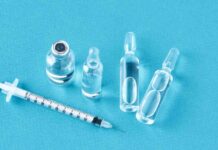Navigating the Delta Variant Surge: Key DNC Takeaways and Free Covid Testing
As the Delta variant of COVID-19 continues to surge, it is crucial for individuals to stay informed and take necessary precautions to protect their health. In light of this ongoing public health crisis, the recent Democratic National Convention (DNC) addressed key healthcare issues and initiatives aimed at combating the pandemic. Additionally, the federal government announced plans to distribute another round of free Covid-19 tests starting in late September to help individuals stay vigilant against the virus as we enter the fall and winter months.
### The Biden Administration’s Antiviral Program for Pandemics
In response to the COVID-19 pandemic, the Biden administration unveiled the Antiviral Program for Pandemics in June 2021, allocating $3.2 billion across various government agencies and academic labs to prepare for future pandemic threats. However, a recent report by STAT’s Jason Mast revealed that despite significant funding and efforts, the program failed to materialize into a comprehensive and effective structure. With $577 million already spent by taxpayers, the program’s outcome is limited to a few research papers and molecules, highlighting a missed opportunity to establish a robust pandemic response infrastructure.
### Addressing Cancer Care Disparities for Transgender Individuals
Transgender individuals often face significant disparities in healthcare, particularly in cancer care. A study published in JAMA Network Open utilized social media posts to shed light on the challenges faced by trans people in accessing appropriate cancer treatment. The analysis of over 1,200 posts revealed themes of misgendering, lack of awareness among clinicians, and difficulties in accessing care, underscoring the need for improved healthcare services tailored to the transgender population. While social media research has its limitations, it provides valuable insights for advancing equitable healthcare for transgender individuals.
### Rising Trend of Physician Leadership in Elite Institutions
Elite universities such as Harvard, Penn, and Columbia have recently appointed medical doctors as presidents or interim presidents, reflecting a broader trend of physician leadership across various organizations. This phenomenon has been attributed to the unique skill set and decision-making capabilities honed by clinicians in healthcare settings. According to Guy David, a health care management professor, clinical experience in hospitals can prepare physicians to effectively lead institutions, demonstrating the value of medical expertise in leadership roles.
### Key Health Topics at the DNC and the Fight for Healthcare Rights
At the DNC, Democrats underscored the importance of protecting abortion rights and restoring faith in America’s healthcare system. Vice President Kamala Harris criticized the repeal of Roe v. Wade under the Trump administration, highlighting the ongoing battle for reproductive freedom. The DNC emphasized the urgency of addressing crucial health issues and ensuring equitable access to healthcare for all Americans. In response, the Trump campaign has articulated its stance on healthcare policies, setting the stage for a contentious debate on key health topics.
### Impacts of the Affordable Care Act on Individuals with Criminal Involvement
Individuals involved in the criminal justice system often face barriers to healthcare access, leading to disparities in insurance coverage and health outcomes. A recent study published in JAMA Health Forum examined the effects of the Affordable Care Act (ACA) and expanded Medicaid programs on this population’s healthcare access, insurance costs, and overall well-being. While the ACA was associated with reduced rates of uninsured individuals, the impact on access to care and health outcomes remained inconclusive. The study called for further research to better understand how healthcare policies affect at-risk populations with criminal involvement.
### Expansion of Free Covid-19 Testing Initiatives
In response to the escalating Delta variant surge, the federal government announced plans to distribute additional rounds of free Covid-19 tests starting in late September. This initiative aims to provide individuals with access to testing resources as we enter the upcoming respiratory illness season. With Covid activity on the rise, the distribution of free tests through Covidtests.gov will enable people to monitor their health and take necessary precautions against the virus. By strategically timing the launch of the testing program, the government aims to ensure widespread access to testing resources during the holiday season and beyond.
In conclusion, navigating the Delta variant surge and addressing key healthcare issues require a comprehensive approach that prioritizes equitable access to healthcare, robust pandemic response strategies, and proactive measures to protect public health. By staying informed, advocating for healthcare rights, and utilizing available resources such as free Covid-19 testing, individuals can contribute to the collective effort of combating the pandemic and promoting health and well-being for all.

















